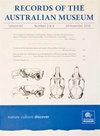巴斯海峡群岛长鼻Potorous tridactylus (Kerr, 1792)的亲缘关系,附注Potorous tridactylus benormi Courtney, 1963
IF 0.8
4区 生物学
Q4 ZOOLOGY
引用次数: 2
摘要
巴斯海峡是澳大利亚哺乳动物的重要生物地理屏障,经常导致大陆和塔斯马尼亚岛跨巴斯分布物种种群之间的显著遗传分化。巴斯海峡的国王群岛和弗林德斯群岛是曾经连接塔斯马尼亚岛和澳大利亚大陆的陆桥的最大遗迹。由于它们的位置偏远,自欧洲人定居以来,岛上的栖息地消失,人们对跨越前陆桥的物种进化运动知之甚少。在这里,我们展示了从博物馆皮肤中产生的关于长鼻Potoroo、Potorous tridactylus(Kerr,1792)的国王岛和弗林德斯岛种群的遗传数据,以调查它们与该物种其他种群的亲缘关系。我们还评估了1963年在国王岛描述的亚种Potorus tridactylus benormi Courtney的有效性。对两个线粒体部分DNA基因(CO1,ND2)的分析表明,国王岛和弗林德斯岛上的波托罗人与塔斯马尼亚人的亲缘关系比大陆波托罗人口更密切。benormi的正模和副模的分子和形态学数据不支持单独的分类地位,并将其归入塔斯马尼亚亚种Potorus tridactylus apicalis(Gould,1851)。本文章由计算机程序翻译,如有差异,请以英文原文为准。
Genetic relationships of Long-nosed Potoroos Potorous tridactylus (Kerr, 1792) from the Bass Strait Islands, with notes on the subspecies Potorous tridactylus benormi Courtney, 1963
Bass Strait is an important biogeographic barrier for Australian mammals, often resulting in significant genetic differentiation between populations on the mainland and Tasmania for species with a trans-Bassian distribution. King and Flinders Islands, in Bass Strait, are the largest remnants of the land bridge that once linked Tasmania with mainland Australia. Due to their remote locality and habitat loss on the islands since European settlement, little is known about the evolutionary movements of species across the former land bridge. Here we present genetic data, generated from museum skins, on the King and Flinders Island populations of Long-nosed Potoroo, Potorous tridactylus (Kerr, 1792) to investigate their affinities with other populations of this species. We also assessed the validity of the subspecies Potorous tridactylus benormi Courtney, 1963 described from King Island. Analysis of two partial mitochondrial DNA genes (CO1, ND2) indicate that potoroos on King and Flinders Islands are more closely related to Tasmanian rather than mainland potoroo populations. Molecular and morphological data from the holotype and paratype of Potorous tridactylus benormi does not support separate taxonomic status and places it within the Tasmanian subspecies Potorous tridactylus apicalis (Gould, 1851).
求助全文
通过发布文献求助,成功后即可免费获取论文全文。
去求助
来源期刊
CiteScore
0.90
自引率
0.00%
发文量
9
审稿时长
>12 weeks
期刊介绍:
Records of the Australian Museum, volume 62 was published in 2010, volume 63 in 2011. Monographic works of particular significance are published irregularly as Records of the Australian Museum, Supplements (ISSN 0812-7387).

 求助内容:
求助内容: 应助结果提醒方式:
应助结果提醒方式:


